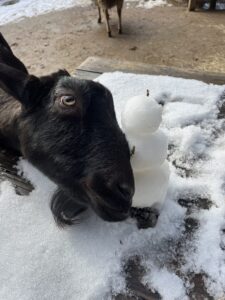Caring for the G.O.A.T in their golden years
 They are, in fact, the G.O.A.T (greatest of all time). All goats (and sheep) are. At Zoo Atlanta we have six sheep and 12 goats who call the Orkin Children’s Zoo home, ranging in age from just over 1 year to almost 12 years old. In fact, we have five goats and sheep who are over 11 years old. Contact yard favorites Phineas and Ferb, Sheldon, Benson, and Hobbes are what we consider geriatric, with Hobbes being the oldest of the bunch. The average lifespan of a domestic goat or sheep is between 10 and 12 years. As our goats and sheep get older, we support them in many ways, assessing their well-being constantly.
They are, in fact, the G.O.A.T (greatest of all time). All goats (and sheep) are. At Zoo Atlanta we have six sheep and 12 goats who call the Orkin Children’s Zoo home, ranging in age from just over 1 year to almost 12 years old. In fact, we have five goats and sheep who are over 11 years old. Contact yard favorites Phineas and Ferb, Sheldon, Benson, and Hobbes are what we consider geriatric, with Hobbes being the oldest of the bunch. The average lifespan of a domestic goat or sheep is between 10 and 12 years. As our goats and sheep get older, we support them in many ways, assessing their well-being constantly.
Because our goats and sheep are in a public contact area, we have keepers with them six hours a day, every single day. That means they are some of the most observed animals by staff in the Zoo! We are always looking for any changes in personality, behavior, or physical condition that could indicate an animal might need some extra TLC. Additionally, we have a formal well-being assessment completed by caregivers quarterly for every individual goat and sheep. If we see an issue, we complete an additional assessment for that animal that digs even deeper!
Some ways we see changes in our goats and sheep as they age are similar to what you might expect with your dogs or cats at home. They may lack energy, lose weight, or get confused. When we see changes in our animals, we act right away. For example, as goats and sheep age, they have a harder time keeping weight on their frame. When we observe this, we go from bi-monthly weights to weekly weights to closely monitor any weight loss. We also give them “orchard time.” This is time away from the youngsters in the herd where they get a different, more enticing, type of hay to eat. We also may offer them a grain diet once or twice per day.
If we see that they spend more time resting, we’ll ensure they have fluffy hay beds in their favored spots at all times. Each individual seems to have a place they find most comforting in the yard. We give them the option to remain in the petting zoo or stay in the side yard away from guests. Most often, they want to be where the people are! Lastly, if we see any cognitive decline, we give them special attention to ensure they are finding enrichment items and able to maintain their place in the herd hierarchy.
We work closely with our veterinary staff to ensure any diet changes, routine changes, or end-of-life decisions are made with all the information available. When it comes time to have an end-of-life conversation, the entire care staff is involved in lengthy discussions to ensure our animals end their life the same as they lived it – with dignity, care, and respect.
Be sure to say hello to these very special seniors next time you see them!
Rebecca Young
Curator of Ambassador Animals and Behavioral Management

Connect With Your Wild Side #onlyzooatl